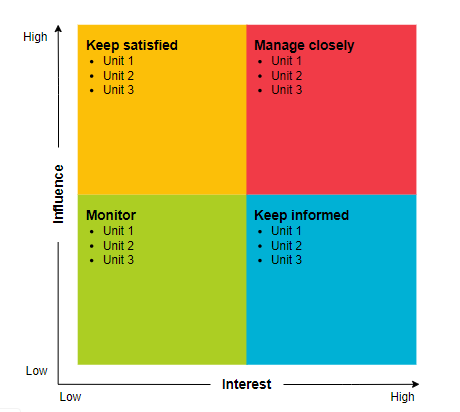Effective communication is the cornerstone of successful project management. It’s the conduit through which ideas, plans, and progress flow. As a project manager, mastering communication across various phases of a project is not just beneficial—it’s essential. Here’s a comprehensive guide to navigate through the communication demands in each project phase:
Phase 1: Initiation
1. Establish Clear Objectives: Communicate project goals, scope, and objectives with stakeholders. Use clear, concise language to ensure everyone understands the project’s purpose.
2. Identify Stakeholders: Create a stakeholder communication plan outlining who needs what information, how often, and through which channels. Engage stakeholders to understand their expectations and concerns.
Note that before planning communication strategies, conducting stakeholder mapping is a vital initial step. This process involves identifying and categorizing stakeholders based on their interests, influence, and impact on the project. See our post about Stakeholder Mapping Tools.
Use this Stakeholder matrix as a guide to keep track of your communication based on the stakeholder influence and impact on the project.

Phase 2: Planning
3. Develop a Communication Plan: Document a detailed communication plan specifying communication frequency, methods, responsible parties, and escalation procedures. It should encompass both internal and external communications.
4. Set Communication Protocols: Define protocols for meetings, reports, emails, and updates. Clarify roles, responsibilities, and preferred communication channels to streamline information flow.
Phase 3: Execution
5. Maintain Open Channels: Regularly update stakeholders on project progress, milestones reached, and any potential roadblocks. Use status reports, meetings, and emails to ensure transparency.
6. Active Listening: Communication isn’t just about speaking; it’s equally important to listen actively. Understand concerns, feedback, and suggestions from team members and stakeholders. Acknowledge their input and address their needs.
Phase 4: Monitoring and Controlling
7. Adaptability: Circumstances can change during a project. Communicate changes promptly, explain their impact, and adjust plans accordingly. Ensure everyone is informed to maintain alignment.
8. Conflict Resolution: Address conflicts openly and constructively. Act as a mediator when necessary, facilitating discussions to find mutually beneficial solutions.
Phase 5: Closing
9. Celebrate Achievements: Communicate project success and recognize contributions. Share lessons learned to improve future projects.
10. Formal Closure: Communicate the project’s completion formally, sharing final reports, deliverables, and any outstanding tasks. Discuss future opportunities for collaboration or feedback.
Additional Tips for Effective Communication Throughout:
11. Use Technology Wisely: Leverage project management tools for efficient communication and collaboration. Choose tools that suit your team’s preferences and needs.
12. Clarity and Simplicity: Avoid jargon or overly complex language. Use clear, concise, and understandable language in all communications.
13. Foster a Culture of Communication: Encourage an environment where team members feel comfortable sharing ideas, concerns, and feedback. Emphasize the importance of communication in achieving project success.
14. Continuous Improvement: Regularly assess communication effectiveness and adjust strategies as needed. Solicit feedback from team members and stakeholders to refine communication practices.
Remember, effective communication isn’t a one-time effort; it’s an ongoing process integral to project success. By mastering communication skills and adapting them to each project phase, project managers can ensure smoother workflows, stronger relationships, and ultimately, successful project outcomes.

Managing unruly projects
Navigating through the chaos often demands a hero armed with more than just a cape

Where is the Glory for PMs?
The answer lies in understanding the essence of what we do and the impact our work has on shaping outcomes.

Embracing Servant Leadership
In agile methodologies, Scrum stands as a framework that promotes collaboration, adaptability, and iterative progress.